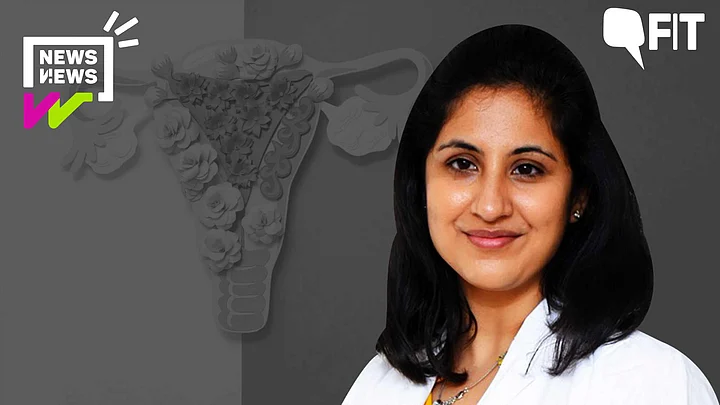Cervical cancer is the second most common cancer among Indian women, however, few really know what they're dealing with.
India accounts for the highest number of cervical cancer cases, as well as deaths in Asia, according to a recent Lancet study.
What are some symptoms of cervical cancer that you should watch out for? At what age should you start screening for it, and how often? When should you get the HPV vaccine?
To get all these questions answered and more, FIT speaks to Dr Kanika Batra Modi, a gynaecological oncologist at Max hospital Delhi.
Cervical Cancer: Who Is at Risk?
The cervix is the lower part of the uterus. Cancer of this area is called cervical cancer. So anyone with a uterus can get cervical cancer.
"One of the most important risk factors of cervical cancer is the HPV virus (Human papillomavirus). It occurs and infects the vaginal area. 90 percent of HPV infections clear out, but in the rest of the 10 percent, it can develop into a precancerous lesion."Dr Kanika Batra Modi, Gynaecological Oncologist, Max Hospital, Delhi
"One can only acquire HPV infection after the onset of sexual activity as its an STI (sexually transmitted infection)."
However, there are also other factors that increase the risk of cervical cancer. These include,
Having a weakened immune system
If you are on immunosupressants because of some autoimmune disease, like HIV
Other STIs like Chlamydia
Unsafe sex
As far as the age groups that are more prone to the disease are concerned, Dr Modi says, "it has a bimodal distribution."
This means that there are two age groups at which the incidents of cervical cancer peaks. "One is around 40 - 45 years, and the other is around 60 - 65 years."
"But that doesn't mean that the other age groups don't get cervical cancer. I've seen so many young women in their 20s get advanced cervical cancer. So no age is really immune."Dr Kanika Batra Modi, Gynaecological Oncologist, Max Hospital, Delhi
Deadly, But Preventable
"Approximately half the people diagnosed with cervical cancer die of the disease," says Dr Modi.
She goes on to explain that this is because many of them get detected quite late at advanced stages.
One reason for late detection could also be that cervical cancer in early stages is mostly asymptomatic. "Some people may experience post-coital bleeding."
"In advanced cases though, you might present with abnormal bleeding, abnormal foul smelling discharge and if its too advanced, it might cause back pain also."Dr Kanika Batra Modi, Gynaecological Oncologist, Max Hospital, Delhi
But here's the thing, cervical cancer is preventable.
"From the onset of HPV to the development of cancer, it takes about 10 to 15 years so we have that much time to pick it up," says Dr Modi.
"As soon as the person is sexually active, start getting screened, and you wouldn't develop it. We have ways ways to deal with the precancerous lesions too," she adds.
"Up to the age of 30, only pap smear test is needed every three yearly. After the age of 30, HPV virus detection tested needs to be done along with the pap smear. If the reports are normal, the frequency can be upped to 5 yearly."Dr Kanika Batra Modi, Gynaecological Oncologist, Max Hospital, Delhi
"We also have effective ways of doing self sampling now," she says. "You can test yourself at home by yourself."
What About the HPV Vaccine?
We already have an HPV vaccine, and now, we also have a made-in-india HPV vaccine that's set to hit the market soon. It is hoped that the indeginous vaccine will help bring down the cost of it.
"There are different strains of HPV, and the current vaccine that we have is a nonavalent vaccine, which means it is active against nine strains of HPV vaccine."Dr Kanika Batra Modi, Gynaecological Oncologist, Max Hospital, Delhi
Can you still take the HPV vaccine if you're over the age of 15? Yes, says Dr Modi.
"The best age to start the vaccination is at ages 9 to 11, before the person is sexually active. But, you can still get it if you're over the age of 15," she says.
"The vaccine is most effective if the person takes it before they are sexually active. But, according to the Indian guidelines given by FOGSI (Federation of Obstetric and Gynecological Societies of India), it is recommended till the age of 45."Dr Kanika Batra Modi, Gynaecological Oncologist, Max Hospital, Delhi
Dr Modi says that as you age, and if you are sexually active, the efficacy of the vaccine goes down, so the call to get vaccinated must be taken on a person-to-person basis.
Listen to the full episode here.
(Check out other episodes of News and Views, and all other podcasts by The Quint on our website, or wherever you get your podcasts.)

